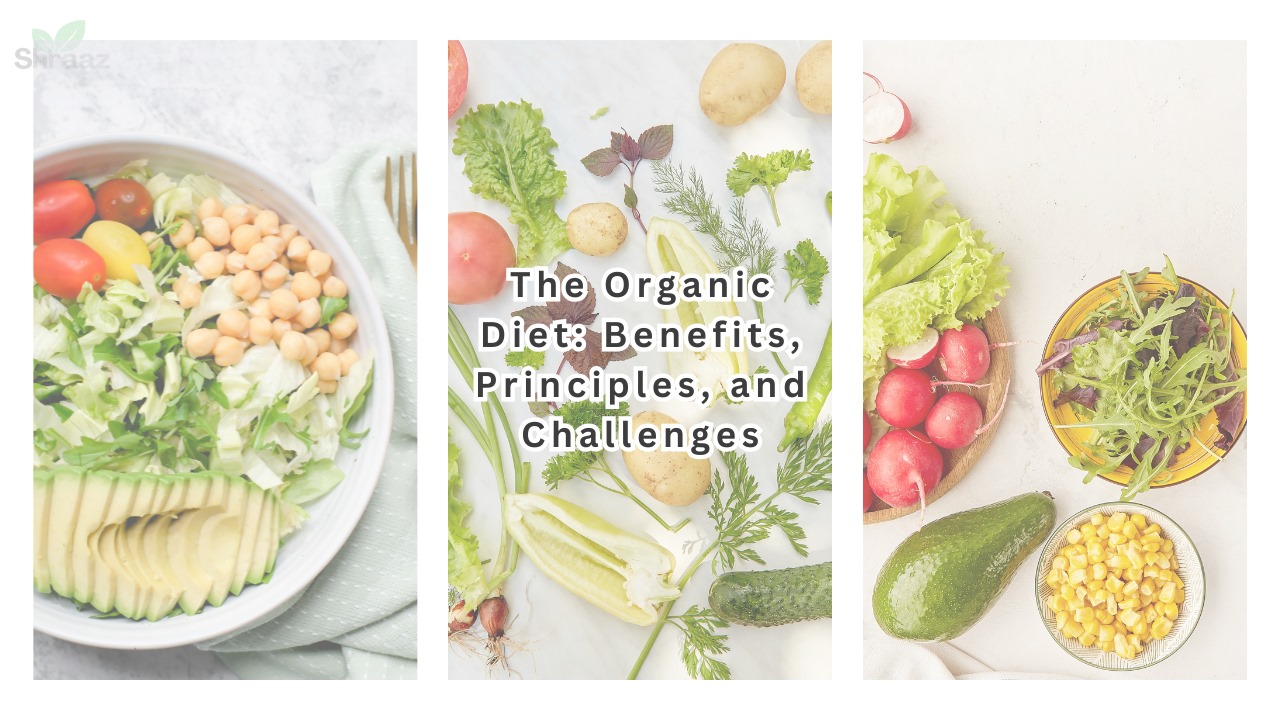The Organic Diet: A Comprehensive Guide to Healthy and Sustainable Eating
Introduction
An organic diet refers to the consumption of foods produced through organic farming methods, emphasizing the avoidance of synthetic chemicals, genetically modified organisms (GMOs), and artificial additives. Organic farming also promotes animal welfare, sustainable agricultural practices, and environmental conservation. Over the past two decades, organic diets have seen a significant rise in popularity, with global sales of organic food and beverages surpassing $120 billion in 2020, driven by consumer concerns about health, environmental sustainability, and ethical food production.
This article aims to explore the core principles behind organic farming, the nutritional and environmental benefits of an organic diet, and other key aspects such as certification, costs, and accessibility. We’ll also address the common myths and challenges associated with organic foods and take a look at the future of organic farming.
The Core Principles of Organic Farming
Organic farming is centered around maintaining ecological balance, promoting soil health, and preserving biodiversity. It uses natural methods for pest control, crop rotation, and animal welfare practices, eliminating the need for synthetic fertilizers, pesticides, and genetically modified organisms (GMOs).
1. Soil Health
One of the most important principles of organic farming is maintaining healthy soil. Organic farmers use natural methods such as crop rotation, composting, and green manure to enhance soil fertility and structure. Healthy soil supports higher nutrient levels in plants, improves water retention, and reduces soil erosion. According to the Food and Agriculture Organization (FAO), organic farming increases soil organic matter by 30-50% compared to conventional methods.
2. Pest and Weed Control
Organic farming avoids the use of synthetic pesticides, instead employing biological pest control, companion planting, and mechanical weeding to protect crops. For example, introducing natural predators, such as ladybugs to control aphids, is a common organic pest management strategy. This reduces the need for harmful chemicals, which can leach into soil and water systems.
3. Animal Welfare
In organic animal farming, livestock are raised with strict animal welfare standards. This includes providing access to pasture, organic feed, and not using antibiotics or growth hormones. Studies have shown that organic livestock farming can improve the health and quality of life for animals, leading to healthier and more ethical meat, dairy, and egg production.
4. Biodiversity
Organic farming promotes biodiversity by avoiding monoculture (the cultivation of a single crop). Crop rotation and polyculture (growing multiple crops together) help in preventing disease outbreaks and pest infestations, naturally balancing ecosystems. A 2016 study by the University of Oxford found that organic farms harbor 30% more biodiversity compared to conventional farms.
The combination of these practices results in more resilient ecosystems, healthier plants, and ultimately, healthier food.
Nutritional Benefits of an Organic Diet
Many proponents of organic diets claim that organic foods offer superior nutrition compared to conventionally grown produce. While the nutritional differences can sometimes be subtle, there is growing evidence that organic foods may offer higher levels of certain vitamins, minerals, and antioxidants.
1. Higher Antioxidant Levels
Several studies suggest that organic fruits and vegetables contain significantly higher levels of antioxidants compared to their conventional counterparts. A meta-analysis published in the British Journal of Nutrition in 2014 found that organic crops had, on average, 17% higher concentrations of antioxidants. These compounds are known to reduce the risk of chronic diseases, such as heart disease, cancer, and neurodegenerative disorders.
2. Reduced Pesticide Residue
Organic foods are free from synthetic pesticide residues. A study by the European Parliament in 2016 found that switching to an organic diet could reduce pesticide exposure by as much as 90%. Pesticide residues have been linked to various health issues, including developmental problems in children, endocrine disruption, and even cancer. Thus, consuming organic foods can lower the risks associated with these harmful chemicals.
3. Higher Omega-3 Fatty Acids in Organic Meat and Dairy
Organic meat and dairy products are typically higher in omega-3 fatty acids, which are essential for heart and brain health. Grass-fed livestock, commonly raised in organic farming, produces meat and dairy with up to 50% more omega-3 fatty acids than conventionally raised animals. These beneficial fats are linked to improved cardiovascular health, reduced inflammation, and better cognitive function.
While the nutritional advantages of organic foods may not be universally consistent, they generally offer a cleaner and safer option for those concerned with chemical exposure.
Organic Diet and Environmental Benefits
One of the most compelling arguments for adopting an organic diet is its positive impact on the environment. Organic farming methods aim to reduce the environmental footprint of food production while promoting sustainable practices that benefit ecosystems and biodiversity.
1. Reduced Soil and Water Contamination
Conventional farming relies heavily on chemical inputs like synthetic fertilizers and pesticides, which can pollute soil and water systems. Runoff from agricultural fields often carries these pollutants into rivers, lakes, and oceans, contributing to problems such as eutrophication. Organic farming avoids these harmful chemicals, protecting natural ecosystems and preserving clean water sources.
2. Carbon Sequestration and Climate Change Mitigation
Organic farming has the potential to combat climate change by increasing carbon sequestration in the soil. Through practices like crop rotation, cover cropping, and reduced tillage, organic farms enhance the soil’s ability to store carbon, helping to reduce the overall concentration of greenhouse gases in the atmosphere. A study by the Rodale Institute found that organic farming can sequester up to 7,000 pounds of CO2 per acre annually.
3. Biodiversity Support
As mentioned earlier, organic farms support greater biodiversity, which is crucial for maintaining resilient ecosystems. This includes a higher number of beneficial insects, birds, and other wildlife. Organic farms create more favorable conditions for pollinators like bees, which play a vital role in food production.
4. Energy Efficiency
Organic farming typically uses less energy compared to conventional farming, as it relies on fewer fossil fuel-based inputs. A study published in the journal Nature Communications found that organic farms use 30-50% less energy per unit of food produced compared to conventional farms, making them more sustainable in the long term.
Organic Certification and Labels
Organic certification ensures that food products meet specific standards, which can vary by country but generally require compliance with strict guidelines. Understanding these certifications and labels is essential for consumers to make informed choices about organic products.
1. Standards for Organic Certification
In the United States, organic certification is overseen by the U.S. Department of Agriculture (USDA). For a product to be labeled “organic,” it must be grown or raised without synthetic pesticides, fertilizers, GMOs, or antibiotics. Similarly, the European Union and other countries have their own certification bodies that set standards for organic food production.
2. Types of Organic Labels
- 100% Organic: All ingredients must be certified organic.
- Organic: At least 95% of ingredients must be organic.
- Made with Organic Ingredients: At least 70% of ingredients are organic.
3. Organic vs. Natural
It’s essential to note that “natural” does not mean organic. While “natural” foods may be minimally processed, they do not follow the same strict standards as organic foods and may still contain synthetic additives or GMOs.
Certification plays a crucial role in ensuring the integrity of organic products, providing transparency and trust for consumers seeking organic options.
Organic vs. Non-Organic: Debunking Myths
As the popularity of organic diets has grown, several myths and misconceptions have emerged, often leading to confusion for consumers. In this section, we will address common myths and offer a balanced perspective based on scientific evidence.
1. Myth 1: Organic Food is Always Healthier
Many people believe that organic food is inherently more nutritious than non-organic food. While studies have shown that organic foods can have higher levels of certain nutrients like antioxidants and omega-3 fatty acids, the overall differences in nutritional content between organic and conventional foods are not always significant.
A review published in The American Journal of Clinical Nutrition in 2012 found no consistent evidence that organic foods were more nutritious than conventionally grown food. However, the study did highlight other benefits of organic foods, such as lower pesticide residues and higher levels of beneficial plant compounds.
2. Myth 2: Organic Foods Have No Chemicals
It’s a common misconception that organic foods are completely chemical-free. While organic farming avoids synthetic pesticides and fertilizers, it does allow for the use of certain natural pesticides, such as neem oil or pyrethrin, which are derived from plants or minerals.
However, organic pesticides are generally considered less harmful to human health and the environment compared to synthetic chemicals used in conventional farming. For example, synthetic pesticides like glyphosate, which is commonly used in non-organic agriculture, have been linked to health risks such as cancer, whereas natural alternatives are usually less toxic.
3. Myth 3: Organic Farming Can’t Feed the World
Critics often argue that organic farming is not productive enough to meet the demands of a growing global population. While organic farms may have lower yields compared to conventional farms—typically 20% lower, according to a meta-analysis in Nature—there are ways to close the gap through improved organic farming techniques, such as integrated pest management and precision farming.
Moreover, the environmental benefits of organic farming, such as improved soil health and reduced chemical pollution, suggest that a transition to more organic farming could be a more sustainable solution in the long run. A balanced approach that combines organic practices with sustainable innovations may be key to feeding the world while minimizing environmental harm.
Costs and Accessibility of Organic Foods
One of the most common criticisms of organic foods is their higher cost compared to conventionally grown foods. Organic produce can sometimes cost 20-50% more, making it less accessible to lower-income households. Let’s explore why organic foods are more expensive and how consumers can make organic eating more affordable.
1. Why is Organic Food More Expensive?
There are several reasons for the price premium on organic foods:
- Labor-Intensive Farming Practices: Organic farming requires more manual labor, especially for tasks like weeding, crop rotation, and animal care. Without the use of synthetic chemicals, farmers need to invest more time and effort in managing crops and livestock.
- Smaller Yields: Organic farms generally produce lower yields than conventional farms. A study published in Proceedings of the Royal Society B found that organic farms yield 19-25% less on average.
- Certification Costs: Organic certification involves extensive documentation and regular inspections, which can be costly for farmers.
- Supply Chain Costs: Organic foods often have more complex supply chains, especially since they require separate handling from non-organic products to avoid contamination.
2. Making Organic Foods More Accessible
Despite the higher cost, there are ways consumers can access organic foods more affordably:
- Farmers’ Markets and CSAs (Community-Supported Agriculture): Buying directly from local farmers often reduces costs and supports the local economy. Many organic farmers sell their products at farmers’ markets or through CSA programs where consumers subscribe to receive regular deliveries of seasonal produce.
- Prioritize Organic for Certain Foods: The Environmental Working Group (EWG) publishes an annual “Dirty Dozen” list of produce that tends to have the highest pesticide residue levels, such as strawberries, spinach, and apples. Prioritizing organic purchases for these foods can reduce pesticide exposure without fully committing to an all-organic diet.
- Buy in Bulk: Some organic products, like grains, beans, and seeds, can be more affordable when purchased in bulk.
3. Government Policies and Subsidies
Government support for organic farming could also play a role in making organic foods more affordable. Some countries, like Denmark, have implemented subsidies and tax breaks for organic farmers, which helps reduce prices for consumers. In the U.S., the 2018 Farm Bill allocated $50 million annually to support organic research and certification programs, though more policy intervention may be needed to make organic food accessible to all income levels.
Organic Diet for Different Life Stages
Adopting an organic diet may offer specific health benefits during different stages of life, especially for groups like children, pregnant women, and seniors, who are more vulnerable to the negative effects of pesticide exposure.
1. Organic Diet for Children
Children are more susceptible to the harmful effects of pesticides because their bodies are still developing. A study published in Environmental Health Perspectives found that children who ate organic diets had significantly lower levels of pesticide residues in their urine compared to children who ate conventional diets. Given that pesticide exposure in early childhood has been linked to developmental issues and neurological disorders, many parents choose organic food to reduce this risk.
2. Organic Diet for Pregnant Women
Pregnant women may also benefit from an organic diet, as pesticide exposure has been linked to negative pregnancy outcomes, such as low birth weight and preterm delivery. Research in JAMA Pediatrics found that women with higher pesticide exposure had a higher risk of pregnancy complications. Consuming organic food during pregnancy can reduce exposure to these harmful chemicals, supporting a healthier pregnancy and fetal development.
3. Organic Diet for Seniors
For older adults, an organic diet can help mitigate the risk of diseases associated with pesticide exposure, such as cancer and Parkinson’s disease. Additionally, organic foods often contain higher levels of antioxidants, which are beneficial for aging individuals who need to protect against oxidative stress and inflammation. Incorporating nutrient-dense organic fruits, vegetables, and whole grains can support healthy aging and enhance overall well-being in seniors.
Criticisms and Challenges of an Organic Diet
While an organic diet offers numerous benefits, it also faces criticisms and challenges. These range from the limited scientific consensus on its health benefits to concerns about the environmental trade-offs and potential fraud in organic labeling.
1. Limited Scientific Consensus on Health Benefits
Despite the widespread belief that organic foods are healthier, scientific research has produced mixed results. Some studies indicate that organic foods have higher antioxidant levels and lower pesticide residues, while others show minimal nutritional differences. For instance, a study published in The Annals of Internal Medicine in 2012 concluded that there was little evidence of significant health benefits between organic and non-organic foods. This inconsistency in research may stem from the variety of factors that influence food nutrient levels, such as soil quality, climate, and farming practices.
2. Environmental Trade-Offs
Organic farming is often promoted as a more sustainable option, but it isn’t without its drawbacks. Organic farms typically require more land to produce the same amount of food as conventional farms due to lower yields. This could potentially lead to deforestation and habitat destruction if organic farming were to be scaled up significantly. A 2018 study published in Nature Communications suggested that widespread adoption of organic farming without concurrent improvements in efficiency could lead to increased pressure on land use and higher food prices.
3. Fraud and Misinformation
There have been cases of fraud and mislabeling in the organic food industry. Some products labeled as “organic” may not meet the necessary certification standards, either due to fraudulent practices by producers or inadequate oversight by regulatory bodies. In 2017, an investigation by The Washington Post revealed that some imported grains labeled as organic in the U.S. were found to be conventional after further testing. This highlights the importance of robust certification processes and consumer awareness when purchasing organic products.
The Future of Organic Farming and Diets
As consumer interest in organic foods continues to grow, the future of organic farming is likely to see advancements in technology and increased government support for sustainable agriculture.
1. Technological Innovations in Organic Farming
Technological advancements, such as precision farming and AI-driven pest management, have the potential to improve the efficiency of organic farming. These innovations can help organic farmers optimize resource use, reduce waste, and increase yields without compromising the principles of organic agriculture. For example, drones equipped with sensors can monitor soil health and detect pests early, allowing farmers to take targeted action without relying on synthetic chemicals.
2. Potential for Growth in the Organic Market
The global organic food market is projected to grow at a compound annual growth rate (CAGR) of 9.7% from 2021 to 2026, driven by rising consumer demand for clean, sustainable, and ethical food products. Increased government investment in organic agriculture, along with greater consumer awareness of the environmental and health benefits, could further fuel this growth. Countries like Germany, Switzerland, and Denmark are leading the way in organic food consumption, setting an example for other nations to follow.
3. Integration with Broader Sustainable Practices
The organic movement is increasingly being integrated with other sustainable practices, such as reducing food waste, supporting local food systems, and promoting plant-based diets. A holistic approach to sustainability that combines organic farming with other environmentally friendly practices may offer the most effective way to create a food system that is both healthy for people and the planet.
Conclusion
An organic diet offers numerous benefits, from reducing pesticide exposure to promoting environmental sustainability. However, it is not without its challenges, including higher costs, lower yields, and questions about its long-term viability as a solution for global food security. While the scientific community continues to investigate the nutritional differences between organic and conventional foods, many consumers are drawn to organic diets for their ethical and environmental advantages. As technology and policy support continue to evolve, organic farming may play a critical role in shaping the future of sustainable food production.
For those interested in reducing their environmental footprint and prioritizing health, an organic diet—whether fully adopted or selectively integrated—can be a meaningful step toward a more sustainable and healthier lifestyle.
References/Additional Reading
- “Organic Farming and Soil Health” – Food and Agriculture Organization (FAO)
- “Antioxidants in Organic vs. Non-Organic Foods” – British Journal of Nutrition
- “Environmental Impact of Organic Farming” – Nature Communications
- “Pesticide Residue Levels in Organic vs. Conventional Foods” – Environmental Health Perspectives
- “The Future of Organic Farming: Innovations and Challenges” – Rodale Institute




